
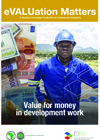
The concept of value for money (VfM) in development work is the subject of much debate and confusion. In VfM analysis by development agencies, four key terms known as the 4 Es are often used. These are Economy – minimizing costs; Efficiency – getting more results for the costs; Effectiveness – successfully achieving the intended outcomes; and Equity – reaching different groups. How are these terms interpreted and applied by development practitioners? Are we getting value for money in development work – and that includes evaluation of development work?
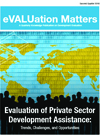
This issue of eVALUation Matters examines the challenges and opportunities as well as the emerging trends of private sector development.
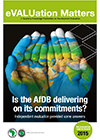
AfDB commitments, whose content varies considerably, collectively affect all facets of the Bank's work. Three independent evaluations were conducted to determine whether the AfDB is delivering on its commitments under GCI VI and ADF 12 and 13 Commitments. These evaluations informed the ADF-13 Mid-Term Review Meeting held in Abidjan, Côte d’Ivoire, from 11-13 November, 2015.Evaluation Matters zooms in on key findings, lessons and recommendations of these evaluations.
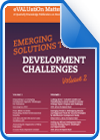
According to Rakesh Nangia, Evaluator General at the AfDB, recent changes observed in the evaluation community comes with “huge potential and huge challenges”. While urging the evaluation community to build on the “new-found momentum,” Rakesh argues “it is critical to making a difference and bringing about the qualitative changes necessary for economic transformation and sustainable development. As in the third quarter, this edition of Evaluation Matters further highlights cutting edge solutions to challenges faced by evaluation practitioners.
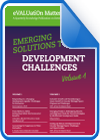
In the third and fourth quarter of 2015, Evaluation Matters zooms on some of the solutions to emerging development challenges.The global development architecture changed significantly in 2015. The Sustainable Development Goals were adopted, a new and ambitious climate change agreement was reached in Paris and there was a shift of paradigm in financing development.

Over the last few decades, evaluation methods have shifted from the dominance of narrow experimental approaches to include a wider range of quantitative designs, the development of more participatory-based consultative models and the application of more sophisticated qualitative and interpretative approaches.